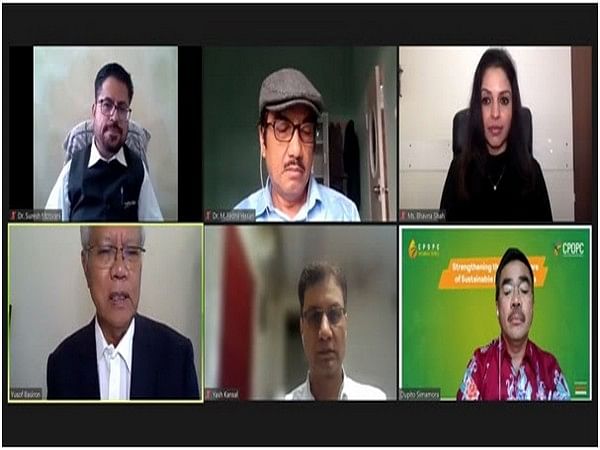
New Delhi [India], August 13 (ANI/NewsVoir): Council of Palm Oil Producing Countries (CPOPC) organized a webinar on the theme, ‘Strengthening the market share of sustainable palm oil in India’ to deliberate upon the prevailing state of palm oil demand-supply chain in India and explore ways to expand the market share of sustainable palm oil in the country which is one of the largest consumers and importers of palm oil in the world.
Eminent industry experts, Dr. Yusof Basiron, Executive Director, CPOPC along with Dr. Suresh Motwani, General Manager, Edible Oil, Solidaridad, Ms. Bhavna Shah, Country Head, Malaysian Palm Oil Council (MPOC) India, Bangladesh, Nepal and Sri Lanka, and Dr. M. Fadhil Hasan, Head of Foreign Affairs, Indonesian Palm Oil Association (IPOA) discussed the key industry issues, challenges, and recommendations for Indian market to establish a transparent and consistent supply chain of sustainable palm oil to meet the ever-growing requirements of Indian consumers. Mr. Yash Kansal, Deputy Managing Director, India, APCO Worldwide moderated the session.
In his opening address, Dr. Yusof Basiron, Executive Director, CPOPC said, “With the collective efforts of major producer countries, Malaysia and Indonesia, stringent schemes like Malaysian Sustainable Palm Oil (MSPO) and Indonesian Sustainable Palm Oil (ISPO) are enacted to ensure sustainability in palm oil industry. While other edible oil crops are struggling with the fulfillment of this responsibility, palm oil contributes to at least 11 of the 17 Sustainable Development Goals. It is time for the other edible oil industries to implement such sustainability frameworks for best practices.”
Dr. Suresh Motwani of Solidaridad while sharing his recommendations on strengthening the market share of sustainable palm oil said, “Greater awareness about benefits of sustainable palm oil among consumers along with government interventions from both producing and consuming countries would play a key role in the uptake of sustainable palm oil.” Highlighting the way forward for India to grow in terms of sustainability he further said, “India is the first country to recognize ISPO and MSPO and the country has its own certification scheme. Together with Solvent Extractor’s Association of India (SEA), Indian Palm Oil Sustainability (IPOS) framework has been made for India to meet the global standards for sustainability. As the largest consumer country, India should create its own Indian Sustainability Standards by taking major inspiration from ISPO and MSPO guidelines.”
Emphasizing the benefits of sustainable palm oil, Ms. Bhavna Shah of MPOC said, “Considering global climate change concerns, sustainable palm oil is the only solution, and the need of the hour and India has a significant role to play in driving sustainable practices. Sustainable agriculture should be the strategy and India needs to make a tailor-made model to address key challenges. Development of sustainable value chain analysis can create profitable solutions for smallholders.”
Dr. M. Fadhil Hasan from IPOA said, “As the second-largest importer of palm oil in South Asia, Indian market has been growing at a fast pace. Recently in India, import duty has been reduced on palm oil whereas the producing nations have brought down the export tax on the commodity. These developments are encouraging and reflect higher sustainable palm oil usage in India.” He further proposed ideas to strengthen cooperation with India, not only on trade but investment, R&D, studies with key stakeholders and foster collaboration with other practitioners in the field of palm oil.
It was also discussed that there is a need to address the lack of knowledge and awareness on palm oil in India along with collective efforts by major producer and consumer countries to ensure sustainable supply chain in palm oil sector. Mr. Dupito D. Simamora, Deputy Executive Director of CPOPC, opined that palm oil in India leads by example in terms of having sustainability certifications than other vegetable oils which currently have no such mandates. With this, palm oil has raised the bar in sustainability standards for other vegetable oils. “As part of its ongoing efforts, India can contribute to the idea of formulating one sustainability standard for all vegetable oils in close collaboration with other major producers of vegetable oils,” he said.
The recording of the webinar will be available soon on CPOPC’s YouTube channel. For the speakers’ presentations: www.cpopc.org/strengthening-the-market-share/
Council of Palm Oil Producing Countries (CPOPC) is an intergovernmental organization for palm oil producing countries. Established in 2015, Indonesia and Malaysia, the world’s biggest palm oil producers, are the founding countries of the Council as well as the current full members.
The Council is now inviting other palm oil producing countries from Africa, Central America and Asia-Pacific. It seeks to unite world’s palm oil producers and furthermore, represents the priorities, interests, and aspirations of the palm oil nations as developing world.
For more information, please visit: www.cpopc.org.
This story is provided by NewsVoir. ANI will not be responsible in any way for the content of this article. (ANI/NewsVoir)
This story is auto-generated from a syndicated feed. ThePrint holds no responsibility for its content.



